MercoPress. South Atlantic News Agency
Tag: Brazil Central Bank
-
Thursday, August 1st 2019 - 09:13 UTC
Brazil's central bank cuts main interest rate to 6%, confident of “reforms' process”
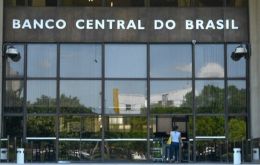
Brazil's central bank slashed interest rates to a record low on Wednesday in response to the worsening outlook for Latin America's biggest economy. The bank cut its main rate to 6% from the previous historic low of 6.5%, which had been unchanged since March 2018.
-
Thursday, June 20th 2019 - 08:50 UTC
Brazil central bank leaves benchmark rate at 6.50%; forecasts of 5.50% by December
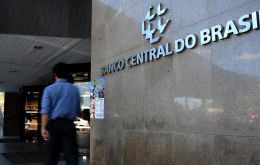
Brazil’s central bank held its benchmark interest rate at a record-low 6.50% on Wednesday, as expected, holding back from signalling looser policy because of doubts on economic reforms. The scenario outlined by policymakers was one of anaemic economic growth and high levels of economic slack putting downward pressure on inflation at home, plus the prospect of interest rates coming down in major developed economies.
-
Wednesday, May 29th 2019 - 09:06 UTC
International capital inflow to Brazil exceeds forecasts
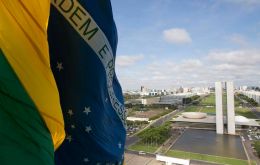
Brazil posted a surprise current account deficit in April, central bank data showed on Monday, although as a share of national economic output Brazil's balance of payments shortfall with the rest of the world is showing signs of stabilizing.
-
Wednesday, April 3rd 2019 - 08:39 UTC
Brazil posts lower trade surplus in March with a strong rise in imports
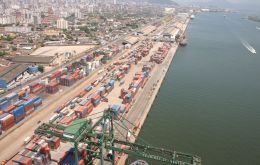
Brazil posted a trade surplus of US$ 4.99 billion in March, the Economy Ministry said, significantly smaller than the same month a year ago thanks to a strong rise in imports. The trade surplus last month fell 22.3% to US$ 4.99 billion from US$ 6.42 billion a year ago, although that was up more than a third from February’s surplus of US$ 3.67 billion.
-
Saturday, March 30th 2019 - 08:02 UTC
Brazil central bank cautious as outside shocks and domestic political tension mount
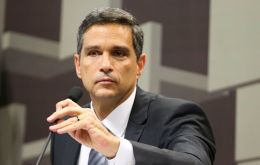
Brazil’s central bank will take its time analyzing the economic impact from an increasing number of shocks from abroad and rising political tension at home that appear to be slowing the government’s reform process, its president said.
-
Friday, March 22nd 2019 - 09:40 UTC
Brazil's central bank with new chief leaves rates unchanged; policy is determined “with caution and serenity”

Brazil's interest rates remained unchanged on Wednesday after the central bank held its first monetary policy meeting under its new chief Roberto Campos Neto. The central bank's unanimous decision -- only the second since pro-business President Jair Bolsonaro took power in January on a promise to revive Latin America's biggest economy -- to keep rates at 6.5% was in line with market expectations.
-
Wednesday, February 27th 2019 - 09:27 UTC
Orthodox, US trained economist, Campos Neto confirmed as Brazilian central bank governor
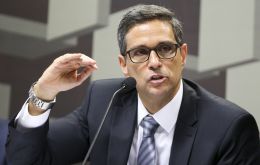
Brazil's Senate-confirmed Roberto Campos Neto as central bank governor on Tuesday, after he stressed that controlling inflation and reining in public spending were critical to supporting economic growth.
-
Thursday, February 7th 2019 - 10:29 UTC
Brazil central bank leaves interest rates at record low 6.5%
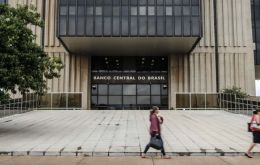
Brazil’s central bank left interest rates at a record low on Wednesday as expected, and signaled it is in no rush to change them even though inflationary pressures have cooled. The bank’s nine-member monetary policy committee, Copom, voted unanimously to keep the benchmark Selic rate at 6.5% for the seventh straight meeting.
-
Saturday, January 5th 2019 - 08:59 UTC
New Brazilian administration prepared to open concentrated banking to foreign competition
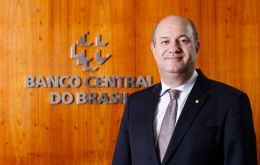
The fast pace of Brazilian president Jair Bolsonaro continued on Friday, with current central bank Governor Ilan Goldfajn telling newspaper Valor Economico that the new administration is likely to empower the central bank to approve the entrance of new foreign lenders into Brazil.
-
Thursday, July 5th 2018 - 08:16 UTC
Brazil industrial production plummets in May on truckers strike

Industrial output in Brazil plummeted in May at the sharpest pace in a decade, highlighting the deep impact of a nationwide truckers' strike in the final weeks of that month. Production fell 10.9% from April, government statistics agency IBGE said on Wednesday, the largest decline since December 2008.
